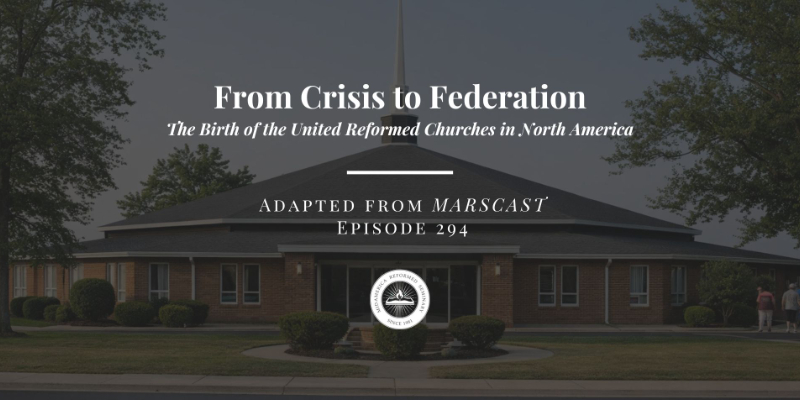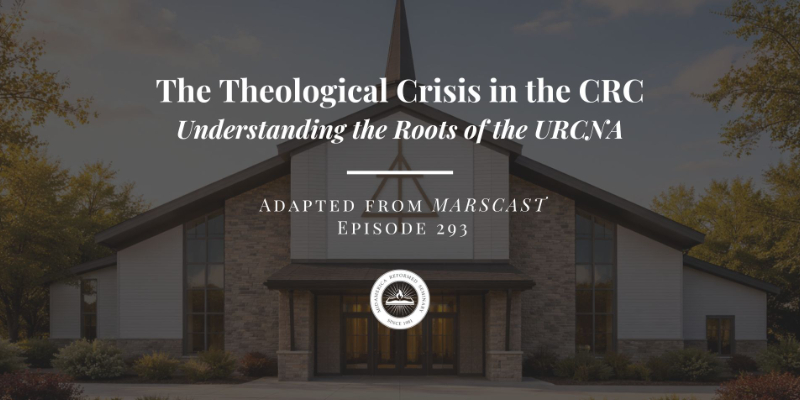
What Is Federal Vision? A Look Into One of the Most Disputed Movements in Reformed Theology
The following is adapted from Mid-America's faculty podcast, MARSCAST, then titled Round Table, featuring Dr. J. Mark Beach, Dr. Alan D. Strange, and Dr. Cornelis Venema.
In this article, we’ll take a theological journey through the contours of one of the most curious, controversial, and consequential theological movements in the recent history of the Reformed tradition: Federal Vision theology.
While this isn’t about parsing doctrinal nuances for the sake of a good debate, though it certainly makes for some vigorous discussion, it’s about understanding a movement that attempted to address very real pastoral concerns but ended up creating even greater theological confusion. It's about a movement that sought to recover what it believed had been lost, a robust view of covenant, church, and sacraments, but ended up challenging some of the foundational truths of the Reformed confessions themselves.
A Movement Born Out of Concern
Let’s begin by granting this: the Federal Vision (FV) movement didn’t originate from a vacuum. In fact, its emergence was sparked by a legitimate desire to address real problems. At a 2002 pastors' conference in Monroe, Louisiana, a group of pastors and theologians gathered to lament what they saw as the sorry state of the American church: a widespread neglect of the visible church, a minimizing of the sacraments, and a hyper-individualized piety that turned faith into a private experience rather than a communal reality.
There was a kind of existential sigh from the proponents of FV: "Why is it that baptized believers walk around riddled with doubt about their salvation? Why do we have such a low view of the church and the means of grace?" These were not unimportant questions. Many in Reformed circles had become accustomed to treating church membership as secondary to personal experience. Baptism was seen as a ceremony with symbolic value rather than a seal of divine promise. And assurance of salvation became a spiritual rollercoaster, driven by internal doubts rather than objective truth.
The Federal Vision, then, wanted to shift the gaze of believers outward. They wanted to say, "Stop looking inside for evidence of grace. Look to the Word, to the sacraments, to the covenant community, to the promises of God." And in that impulse, we can recognize something worth affirming. But it's what they built on that impulse that led them astray.
What Did the Federal Vision Actually Teach?
At the heart of Federal Vision theology is a radical objectivity of the covenant. Baptism, for example, is not merely a sign and seal of God’s covenant promises. In the FV view, it actually unites the baptized to Christ. Through baptism, you receive all the benefits of salvation: union with Christ, justification, sanctification, regeneration. That is, until you don’t.
This teaching, when unpacked, implies a transactional view of baptism that borders on sacramentalism. According to many FV advocates, to be baptized is to be placed "in Christ" in a real, saving way. Yet this raises immediate questions: What of apostasy? Can a person truly be united to Christ and yet fall away? What becomes of the perseverance of the saints?
This is where FV introduces a critical shift. The covenant becomes conditional not just in terms of obedience in sanctification, but obedience in maintaining justification. The emphasis subtly moves from the finished work of Christ to the ongoing faithfulness of the believer. The net effect is that union with Christ becomes unstable; it can be gained through baptism and lost through disobedience. And thus, the heart of the gospel is put at risk.
The Quest for Assurance, and the Treadmill of Performance
It’s ironic. One of the major motivations behind FV theology was the pastoral concern that people in Reformed churches lacked assurance. They looked inward, found sin and inconsistency, and concluded they were likely not elect. The FV answer says, “Look outward. Look to your baptism. See there the visible, objective confirmation that you belong to God.”
But here’s the difficulty: assurance built solely on the fact of baptism becomes assurance tethered to obedience. FV theologians did not stop at saying baptism joins you to Christ; they continued by saying you remain in Christ only so long as you remain faithful. This kind of assurance is conditional and reintroduces the very kind of subjective anxiety that FV hoped to eliminate.
Imagine a believer struggling with sin. They remember their baptism. They recall the promises of God. But then they begin to ask: "Have I been faithful enough? Have I maintained the conditions of the covenant?" And suddenly, the objective promise becomes an object of fear. Assurance doesn’t grow in such soil.
So rather than lifting the burden of introspection, FV reshapes the burden and places it in the context of covenant loyalty. It shifts the gaze from inward navel-gazing to outward performance, which ends up being another form of the same problem. The treadmill of performance doesn’t disappear; it just changes scenery.
Collapsing the Distinctions: One Covenant to Rule Them All
One of the most dramatic theological moves within Federal Vision is the flattening of covenant theology. FV proponents argue for a single covenant that originates in the inner life of the Trinity, into which man is invited. That may sound poetic, but it comes with consequences.
By denying the traditional distinction between the Covenant of Works and the Covenant of Grace, FV unravels a thread that holds together much of Reformed theology. If God has always dealt with humanity in one uniform way, then distinctions between law and gospel, grace and merit, promise and obligation become blurred.
This leads to other doctrinal difficulties, such as the denial of the imputation of Christ’s active obedience. Why? Because if the covenant is one, and if the goal is human faithfulness, then Christ’s perfect obedience is no longer a gift credited to us. It becomes a model we must follow. And in doing so, the gospel becomes more about imitation than substitution.
The result is a system that starts sounding less like the Reformation and more like medieval moralism. In seeking to elevate covenant, FV undermines grace.
Sacraments and the Visible Church: Overcorrection in Action
Federal Vision practically enthrones the sacraments. Baptism is a means of grace, but also a bestowal of grace, a spiritual transaction with permanent implications. The Lord’s Supper nourishes those who believe, but it's also a covenant meal to which all the baptized should be invited, even infants.
To the FV mind, this makes sense. If baptism means inclusion, and if inclusion means union with Christ, then why withhold any covenant privileges? But this conclusion arises from a faulty premise. Historically, Reformed churches have required a credible profession of faith before coming to the table. The Lord’s Supper is not only a sign and seal but also calls those who participate to faith, to discernment, to self-examination, to spiritual participation.
By admitting all the baptized to the table, regardless of profession, FV blurs the boundary between sign and reality. The result is a quasi-sacramentalism that treats visible participation as synonymous with spiritual vitality. But the historic Reformed understanding has always held that the sacrament must be received by faith. It is not a magical rite. It is a covenantal sign that calls for a living response.
Justification: The Doctrinal Epicenter of the Conflict
If there is one doctrine that reveals the fault line between Federal Vision and historic Reformed theology, it is justification. FV speaks not of justification by faith alone, but by a "living" or "obedient" faith. Some go as far as to describe it as "faithfulness."
In the FV framework, justification is received and maintained through a covenantal faithfulness that includes works of obedience. This is a direct challenge to the Reformation principle that justification is by grace alone through faith alone. It introduces a hybrid formula where the act of faith becomes itself a kind of meritorious loyalty.
Historically, faith has always been viewed as the empty hand receiving Christ. It is receptive, not productive. It clings to Christ, not contributes to Him. But when faith is redefined as faithfulness, assurance is no longer grounded in Christ’s righteousness but in our own.
This shift reopens the door to the very theological anxieties the Reformation had slammed shut. No longer can the believer rest in Christ alone. Now they must also prove themselves faithful, not only to enjoy the blessings of salvation but to retain them.
The Gospel at Stake
When all is said and done, the concern with Federal Vision isn’t that it tweaks the confessions or adopts new language. The concern is that it fundamentally redefines the gospel.
Justification becomes mutable. Assurance becomes conditional. The sacraments become magic. The church becomes a border patrol rather than a nurturing mother. The line between the visible and invisible church is erased, and the covenant becomes a maze rather than a map.
And in all of this, the weary sinner, the very one whom Christ came to save, is left wondering if grace is really grace at all.
The gospel is not a call to perform. It is a call to rest in Christ, to rest in His righteousness, and to rest in His finished work. That rest is the true source of assurance. And that rest is what FV theology, despite its intentions, puts at risk.
A Pastoral Response
So what is the right response to Federal Vision?
Not to dismiss the real concerns they raise. Not to double down on subjective, pietistic isolationism. But to return to the rich, robust, balanced theology of our Reformed confessions.
We affirm the objectivity of God’s promises. We affirm the power and importance of the visible church. We affirm the significance of the sacraments.
But we also affirm that salvation is by grace alone, through faith alone, in Christ alone. That justification is not infused, but imputed. That assurance is grounded not in our obedience, but in the unchanging promise of God and the finished work of Christ.
This kind of theology comforts our hearts and anchors the soul, and it keeps the focus exactly where it belongs: on Christ, the author and perfecter of our faith.
In a future installment, we’ll look at the Mid-America faculty’s 2007 booklet Doctrinal Testimony Regarding Recent Errors, where these issues are laid out clearly and pastorally.
Recent articles




